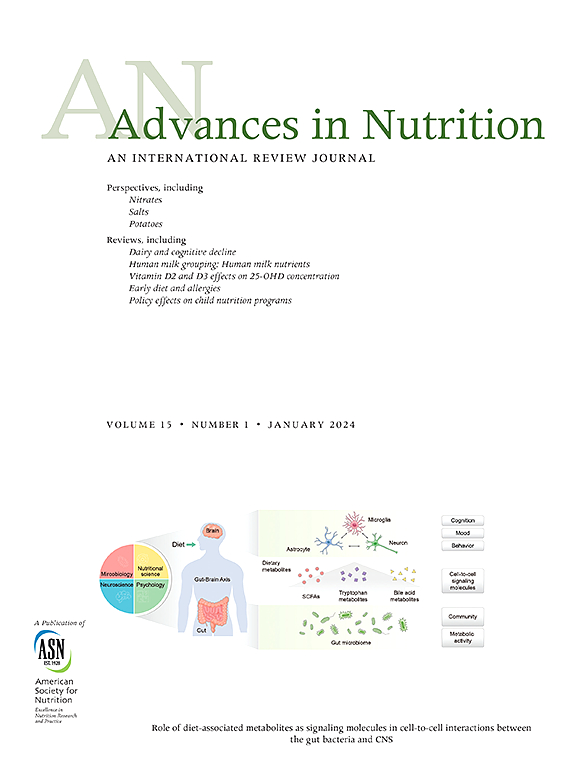观点:补充二十二碳六烯酸和二十碳五烯酸对癌症化疗期间免疫系统的影响:从目前的临床证据来看。
IF 9.2
1区 医学
Q1 NUTRITION & DIETETICS
引用次数: 0
摘要
二十二碳六烯酸(DHA)和二十碳五烯酸(EPA)是omega-3长链多不饱和脂肪酸(n-3 LCPUFAs),对免疫系统具有多效性。虽然一些临床前研究支持它们提高癌症治疗疗效的潜力,但尚未转化为临床研究。目前,在癌症化疗期间补充n-3 LCPUFAs没有官方建议。本综述审查了在接受化疗的癌症患者中补充DHA和/或EPA的人类研究,旨在评估n-3 LCPUFAs对免疫结果的影响。使用电子数据库进行系统检索,包括OvidMedline和GOED(全球EPA和DHA Omega-3s组织)临床研究数据库。本综述纳入了12项试验。DHA+EPA的剂量范围为0.6至4克/天,干预持续时间为6周至6个月。大多数研究证明了一些免疫相关结果的变化,包括炎症的血液标志物(白细胞介素-6 (IL-6)和c反应蛋白(CRP))的减少,不良事件的发生率降低,免疫细胞浓度和功能的保存(吞噬和过氧化氢的产生)。然而,由于研究数量有限和研究设计的异质性,谨慎是必要的。这篇综述讨论了目前研究的局限性以及支持n-3 LCPUFAs在癌症化疗中的研究和潜在应用的机制证据。未来的研究应侧重于解决这些局限性,进行精心设计的大规模临床试验,明确报告在特定化疗方案中补充n-3 LCPUFAs的剂量和持续时间。尽管有一些有希望的结果,但在推荐n-3 LCPUFAs补充剂作为化疗方案的一部分以减轻化疗诱导的免疫改变之前,还需要更多的证据。本文章由计算机程序翻译,如有差异,请以英文原文为准。
Perspective: Implications of Docosahexaenoic Acid and Eicosapentaenoic Acid Supplementation on the Immune System during Cancer Chemotherapy: Perspectives from Current Clinical Evidence
Docosahexaenoic acid (DHA) and eicosapentaenoic acid (EPA) are omega-3 long-chain polyunsaturated fatty acids (n-3 LCPUFAs) with pleiotropic effects on the immune system. Although several preclinical studies support their potential to enhance cancer treatment efficacy, this has not yet been translated into clinical studies. Currently, there are no official recommendations for n-3 LCPUFAs supplementation during cancer chemotherapy. This review examined human studies that supplemented DHA and/or EPA in patients with cancer undergoing chemotherapy, aiming to evaluate n-3 LCPUFAs effects on immune outcomes. A systematic search was conducted using electronic databases, including OvidMedline and the Global Organization for EPA and DHA Omega-3s Clinical Study Database. Twelve studies were included in this review. EPA+DHA doses ranged from 0.6 to 4 g/d, and intervention durations ranged from 6 wk to 6 mo. Most of the studies demonstrated changes in some immune-related outcomes, including reductions in the blood markers of inflammation (interleukin-6 and C-reactive protein), a lower incidence of adverse events, and the preservation of immune cell concentrations and functions (phagocytosis and hydrogen peroxide production). However, caution is warranted due to the limited number of studies and the heterogeneity of study designs. This review discusses the limitations of current studies and the mechanistic evidence supporting the investigation and potential use of n-3 LCPUFAs during cancer chemotherapy. Future research should focus on addressing these limitations by conducting well-designed, large-scale clinical trials that clearly report the dose and duration of n-3 LCPUFAs supplementation during specific chemotherapy regimens. Despite some promising outcomes, more evidence will be needed before recommending n-3 LCPUFAs supplementation as part of chemotherapy regimens aimed at attenuating chemotherapy-induced immune alterations.
求助全文
通过发布文献求助,成功后即可免费获取论文全文。
去求助
来源期刊

Advances in Nutrition
医学-营养学
CiteScore
17.40
自引率
2.20%
发文量
117
审稿时长
56 days
期刊介绍:
Advances in Nutrition (AN/Adv Nutr) publishes focused reviews on pivotal findings and recent research across all domains relevant to nutritional scientists and biomedical researchers. This encompasses nutrition-related research spanning biochemical, molecular, and genetic studies using experimental animal models, domestic animals, and human subjects. The journal also emphasizes clinical nutrition, epidemiology and public health, and nutrition education. Review articles concentrate on recent progress rather than broad historical developments.
In addition to review articles, AN includes Perspectives, Letters to the Editor, and supplements. Supplement proposals require pre-approval by the editor before submission. The journal features reports and position papers from the American Society for Nutrition, summaries of major government and foundation reports, and Nutrient Information briefs providing crucial details about dietary requirements, food sources, deficiencies, and other essential nutrient information. All submissions with scientific content undergo peer review by the Editors or their designees prior to acceptance for publication.
 求助内容:
求助内容: 应助结果提醒方式:
应助结果提醒方式:


